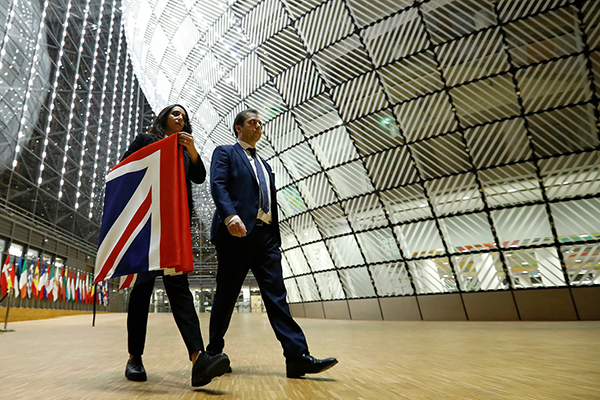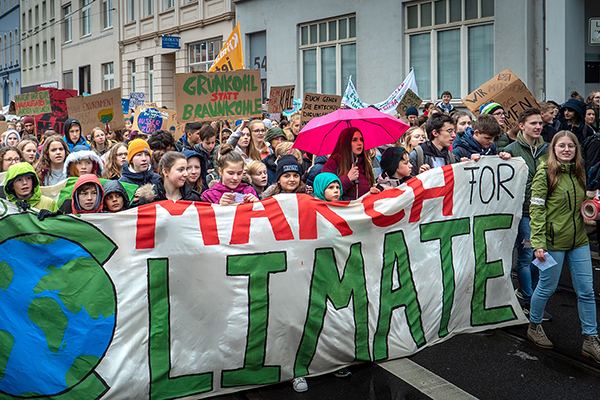The ultimate glossary of the EU in 2020

date: 11/12/2020
Brexit
On 31 January 2020, the United Kingdom left the European Union and started an 11-month transition period. As we send this newsletter out, the EU and the UK are still negotiating a possible agreement on future relations. If there is no deal, the UK will enter 2021 as a third party country for the EU. This means border controls, customs and many other complications.

© European Union
COVID-19
You didn't see that coming , did you? In case you slept through 2020, a short explanation: COVID-19 is the short-form scientific name for a sub-microscopic infectious agent that has turned our reality upside down. To date, World Health Organisation has recorded almost 70 million confirmed infections and over 1.5 fatalities worldwide. The prospect for 2021 is less gloomy with a number of successful vaccines being deployed.
European response
For the EU, this year was mainly about fighting COVID-19. The emergency response included creating a strategic stockpile of medical equipment, the repatriation of over half million Europeans stranded by the pandemic across the world, and pumping hundreds of millions of euros into the economy to support jobs and businesses. Read about 10 things the EU is doing to fight COVID-19 and ensure recovery.
Fusion energy
In July, the EU took a step towards an energy revolution: in France, engineers started assembling the world's largest fusion machine. The International Thermonuclear Experimental Reactor (ITER) will generate energy by reproducing the same fusion reaction as that found in stars. The 35-country project will benefit from €5 billion of EU funding over the next 7 years. The first "plasma" - the point at which ITER will be deemed operational - is planned for late 2025.

© INTER Organization
Infodemic
The disinformation about the virus has spread as quickly as the virus itself. The EU has fought back to dispel COVID-19 myths. More than 3.4 million accounts spreading COVID-19 disinformation have been challenged on Twitter since the beginning of the pandemic, thanks to cooperation between online platforms and the EU institutions. Read about other EU actions to tackle COVID-19 disinformation.
Knuffelcontact
A term used by Belgian health minister, Frank Vandenbroucke, to describe in a figurative way social distancing rules. Taken from Flemish, the term literally means "cuddle contact". One could not think of a sweeter way to describe close contact with another human being.
Money
On 21 July, after 4 days and nights of discussions, the EU leaders reached a historic agreement on the future EU budget. The €1.8 trillion deal includes a long-term budget for 2021-27 and a special recovery fund known as "Next Generation EU". The deal aims to tackle the economic crisis caused by the coronavirus and promote economic recovery. How will the money be spent? Check the infographic.
Climate neutrality
2020 has brought good news for planet Earth - the EU is speeding up efforts to achieve climate neutrality. A few days ago, EU countries agreed to an even more ambitious reduction of greenhouse gas emissions. By 2030, the EU aims to cut its emissions by at least 55% compared to 1990 levels. The EU's aims to be the first to be entirely climate neutral by 2050. How? Check out 5 facts about the EU's goal for climate neutrality.

© Mika Baumeister on Unsplash
Staycation
Also called "holistay", this was the most popular way to spend the summer break this year. It involves staying at home and/or participating in activities near your home. Staycations allowed thousands of Europeans to discover hidden touristic gems in their area.
Teleworking
Once an "unfulfilled dream", today the "new normal" for millions across the EU. Eurofound estimates that around 40% of those currently working in the European Union began teleworking fulltime as a result of the pandemic. Surveys show that working in pyjamas suits us. In July, over three-quarters of employees across the EU wanted to continue working from home at least occasionally, even when COVID-19 is over.
Zygomaticus major
Facial muscles that people need to activate in order to smile. We recommend using them as often as possible in what remains of 2020 and throughout the whole of 2021! Happy New Year!

© Priscilla Du Preez on Unsplash
